Kurt Gänzl
The Encyclopedia of the Musical Theatre
29 August, 2016
Adolf Philipp (b Lübeck, 29 January 1864; d New York, 30 July 1936) was the eclectic leading light of the German-language stage in turn-of-the-century America.

Adolf Philipp as seen in the program for the Volksstück “Klein Deutschland” (Little Germany), with scenes “aus dem New Yorker Leben” (from NY life); presented at the Germania Theater on Eighth Street, between Broadway and Fourth Avenue. From: John Koegel: “Music in German Immigrant Theater; New York City 1840-1940.”
The young Adolf Philipp ran away from home at the age of 17 (when he remembered, he said it was 14), joined a German provincial stock company, and went on to make himself a career as a performer in both straight and musical theatre (‘sometimes as a tenor singer, sometimes as a heavy tragedian, but mostly in light comedy’). This career led him first to Vienna, then to Hamburg and, in the 1891-2 season, to New York for an engagement as principal tenor at Gustav Amberg’s German-language theatre (Duncan in Adolf von Neuendorff’s original operetta Der Minstrel, 18 May 1892 etc). Following Amberg’s collapse, he went on to star in other German pieces at the Terrace Garten and he quickly became a local star in rôles such as Vandergold in Der arme Jonathan, the hero of Zeller’s Der Vagabund, Simon in Der Bettelstudent, Georg in Der Waffenschmied, in Nanon, Der Feldprediger, Apajune der Wassermann, the title-rôle of Le Postillon de Longjumeau, his own Die Royalisten and Der verwunschene Prinz.

A roof top ‘garden theater’ at Madison Square Garden at the turn of the 20th century.
In September 1893, he took on the management of the Germania Theater and there he embarked on a memorable career as manager, star and author, writing and appearing in the large central rôles of a series of often long-running German-Jewish comedies (‘written in a queer composite of English slang and true German’), each and all equipped with plenty of songs for their leading man. This series gained him in some quarters the nickname of `the German Harrigan’ (‘His stage productions put one in mind of a Harrigan play with the locale transferred…’) and his The Corner Grocer of Avenue A (Hein Snut, 750 performances) and A New York Brewer (Hein Lemkuhl, 856 performances) became classics of the German-American stage.

Newspaper advertisement for “Ein New Yorker Brauer” (New York Brewer) in a Adolf Philipp production.
Philipp gained his first mainstream Broadway credit, when the hugely popular The Corner Grocer was anglicized, stuck full of variety acts, and ‘music selected and arranged by Alexander Haig’, and mounted by Russell’s Comedians at the Casino Theater under the title About Town. Jacques Kruger starred in the author’s rôle for the three weeks of the run. In 1896 he was again represented on the Broadway stage by an English adaptation of his Mein New York (Herald Square Theater 14 April) and won considerable praise for his ‘beautifully conceived’ piece. ‘By adroit handling of his characters the author gives us something of the same impression of largeness and reality which Harrigan’s genius used to contrive … as a study of familiar American types, Mr Philipp’s play cannot be too highly praised… there is a scene in a fast-house which the author treats with the skill and hardihood of a Zola’.
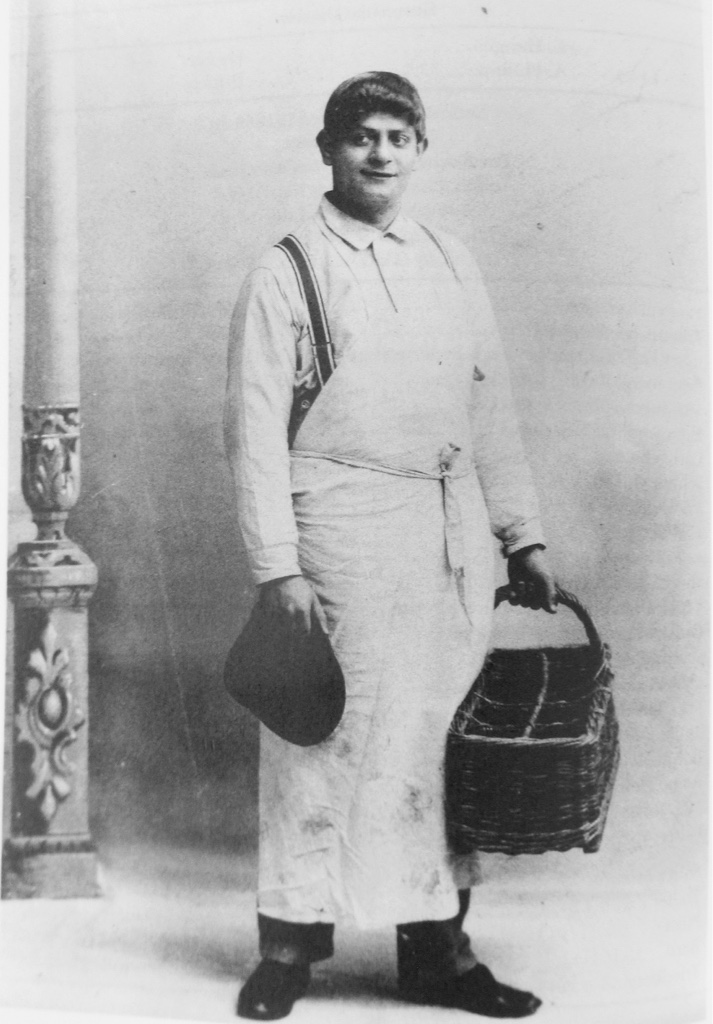
Adolf Philipp as Hein Snut in “Der Corner Grocer aus der Avenue A” (The Corner Grocer from Avenue A). From: John Koegel: “Music in German Immigrant Theater; New York City 1840-1940.”
In 1897 he staged a season (w Leo von Raven) at the Terrace-Garten, appearing in the title-rôle in Fra Diavolo, in a German version of Herbert’s The Wizard of the Nile (19 May 1897) and in Die Royalisten and in 1899 he built a new Arch Street Theater in Philadelphia, which eventually fell into other hands.
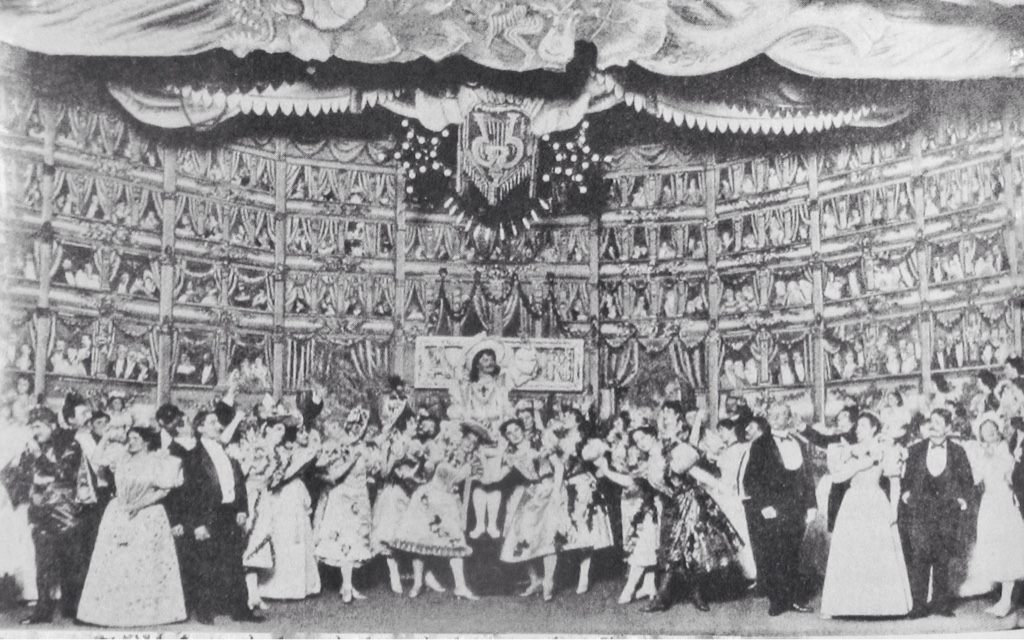
The ball scene from “New York bei Nacht.” From: John Koegel: “Music in German Immigrant Theater; New York City 1840-1940.”
In 1900 (23 April), having – after a barney with theatre-owner Amberg which resulted in his being arrested – purchased the Germania on the proceeds of his successes, he produced a set of original musical comedies for which acted as producer, director, overwhelming star, author, and co-composer. Geheimnisse von New York (played Jochen Kluckhuhn) ran for 102 performances, Der Millionen-Schwab for 104 and the musical comedy called Der Kartoffelkönig which, half a century before The King and I, used a play-within-a-play Uncle Tom’s Cabin to make a point, equalled their records, records which – in spite of the obviously limited audience pool on which Philipp had to draw – compared well with on-Broadway’s productions. The advised press kept an appreciative eye on what was going on at the Germania, and regularly put their appreciation into print. Philipp’s comic abilities won high praise as being ‘above the usual Broadway horseplay’ and his music was noticed as ‘uncommonly good, often excellent’ but, for the moment, his original and idiosyncratic productions did not flow into the Broadway mainstream.

Scene from “Der Pawnbroker von der East Side” with Adolf Philipp and Eugenie Schmitz. From: John Koegel: “Music in German Immigrant Theater; New York City 1840-1940.”
The Germania was closed and knocked down in April 1902, to allow for the extension of the underground railway and the building of Wanamaker’s department store, and Philipp – having bankrupted himself attempting to tour – then returned temporarily to Germany. There, with his brother Paul Philipp (d New York, 21 May 1923) as administrator, himself as artistic director and Oberregisseur and one Ludwig Stein providing the necessary, he opened the 1,000-seater Deutsch-Amerikanische Theater in Berlin (29 August 1903). where, between 1903-7, he staged and starred in a variety of pieces depicting the lives of German immigrants in America, nearly all with more (usually) or less music involved and including his own New York in Wort und Bild, Im wilden Westen (in which he appeared as a Crocodile-Dundeeish cowboy in Berlin), Der Teufel ist los (as Heinrich Dabelstein) Im Lande der Freiheit, Aber, Herr Herzog! (Lied des schwarzen Katze) and Er und ich. His recipe was ‘a pot pourri of fun with touches of pathos sandwiched in’, not to forget the inevitable healthy ration of songs. In February 1906, with some small fanfare, he fêted his 25 years on the stage. In mid-1907, however, after a rather iffy season with their troupe at the Carl-Schultze Theater in Hamburg, the brothers threw in their hand and returned to America where they again attempted a Deutsch-Amerikanische Theater, this time in collaboration with the finances of a certain Herr Adolf Geller, manager of the ‘Zum schwarzen Adler’ music hall on East 86th and 3rd Avenue.
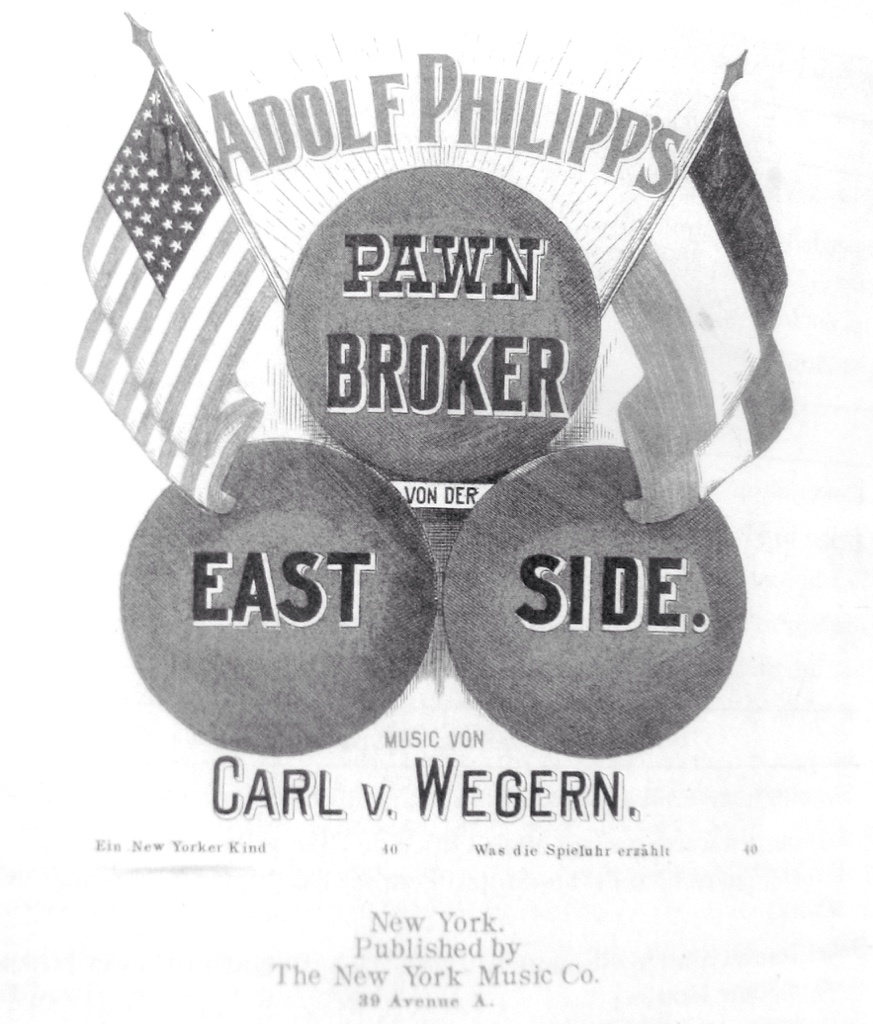
Sheet music cover for Adolf Philipp’s “Pawn Broker von der East Side.” From: John Koegel: “Music in German Immigrant Theater; New York City 1840-1940.”
Philipp mounted an English-langauge production of his New York in Wort und Bild, already played not only in Berlin, where it topped four hundred nights, but also in a Viennese version as Über’n grossen Teich (Theater an der Wien 2 September 1906, mus: Ziegler), under the title From Across the Big Pond (w Mortimer Theise, Circle Theater 7 September 1907, revised version Two Islands 14 October) with himself starred as Louis Strumkohl alongside Anna Boyd, and without luck, but he scored a genuine hit at Geller’s ‘zum schwarzen Adler’ (now converted into a 900-seater and dubbed the ‘Wintergarten’) when, after a long-running revival of Der Corner Grocer, he wrote produced the slightly scandalous musical comedy Alma, wo wohnst du? (1909, credited ‘w Paul Hervé and Jean Briquet’).
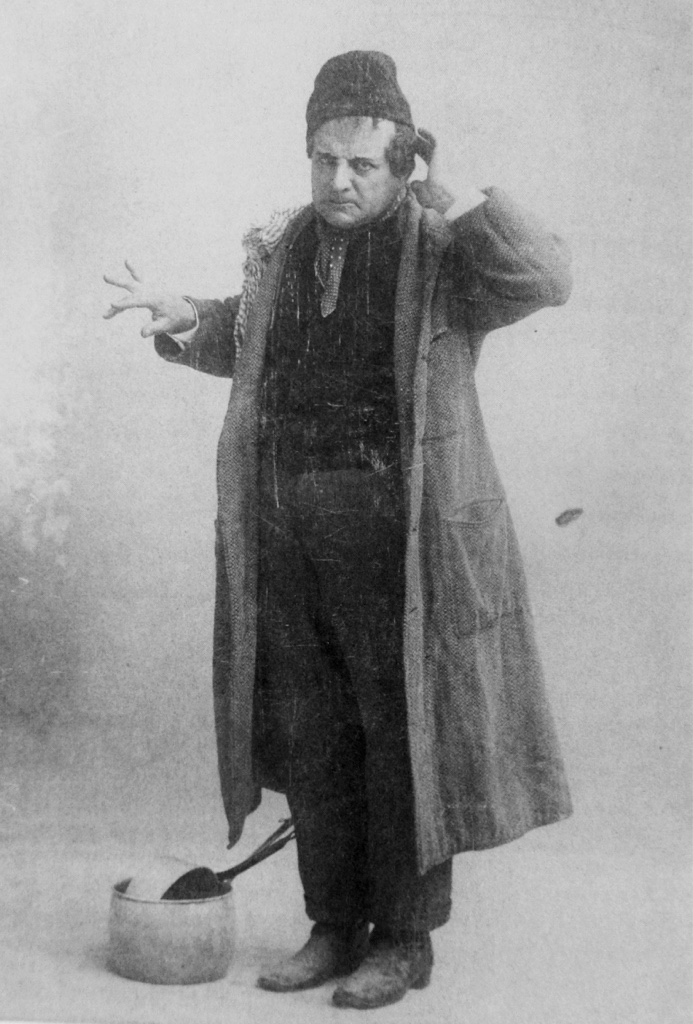
Max Lube as Isaak Rosenstein in “Der Pawnbroker von der East Side.” From: John Koegel: “Music in German Immigrant Theater; New York City 1840-1940.”
This piece gave him a long run as author and star, got him hauled up on a delightfully publicity-worthy morals charge, and was subsequently translated into English and produced with further success on the regular Broadway stage (Weber’s Theater, New York, 26 September 1910, 232 performances).
However, if he got away with his ‘naughtinesses’ this time, when he subsequently produced “Hetty macht alles”, the guardians of New York’s morality decided he had gone too far, the proprietor and star were hauled off to the police courts and the merry musical farce was closed down.
They got him for selling drink in the auditorium, too. Hetty was anglicised by Leon da Costa in 1915 as That’s the Limit, and apparently she was the limit, for I can find no record of her having found her saucy way back to the New York stage. Still, she got to the Grand, Pennsylvania, to the Lyceum, Rochester, and elsewhere (April 1911) where limits and drinking rules were apparently different.

Cross-dressed highlight from “New York bei Nacht”: Bernhard Rank as Thusnelda Mohrrübchen (= Miss Carrot). From: John Koegel: “Music in German Immigrant Theater; New York City 1840-1940.”
The success of Alma however, widened Philipp’s horizons, and his new piece Therese sei nicht bös (daintily translated as Therese, Be Mine) was actually put into rehearsal shortly before Alma’s Broadway opening in both German and English versions. The ubiquitous Adolf, of course, directed both companies, and starred in the German one. And while Therese opened up at New York’s Wintergarten, Theresa set out from Toledo, Ohio, to install herself at the Chicago Opera House (27 September 1910). She didn’t prove as successful as Alma had, but Philipp persisted, and whilst Alma still ran on on Broadway he brought out Hetty. Her fate didn’t deter him either and, in 1912, Philipp established himself as The Adolf Philipp Company, headquartered at the newly built 500-seater 57th Street Theater (later to be better known as the Bandbox), and carried on turning out more musical plays in the Alma vein, both in German and for the more competitive English field. His first production at his new house, the musical Auction Pinochle, with its author starring as Harry Schlesinger, played for 150 nights before being sent out in an anglicised version (Burbank Theater, Los Angeles 5 April 1914), and it was followed by Das Mitternachtsmädel, another piece which was written, like the first, in collaboration with composer ‘Jean Briquet’ and original author ‘Paul Hervé’. Both these gentlemen may have existed – perhaps minor figures on the Paris and Berlin theatre scene – but their names served here only to mask the fact that the producer-author-star had written and composed his shows single-handed. He kept his triple identity secret for some five years before being discovered, and going confessionally into print, at the end of 1915.

Poster for the 1920s movie version of “The Midnight Girl.”
As Alma had done, The Midnight Girl shifted to Broadway and there, under the management of the Shubert brothers and with George Macfarlane starred, it notched up a splendid run of 104 performances (44th Street Theater, 23 February 1914) before going on to the rest of the country
Philipp mounted and starred in a German-language revival of Alma (17 April 1913), followed up with another local-comic musical, Two Lots in the Bronx, which proved good for 100 nights in German and more in English, and which served the author-producer for his debut in the English-speaking and singing theatre, and then — without previous German production – brought what he again tried to fool public and press was ‘a French operetta’ (again home-made with the English aid of the usefully hacking Edward Paulton), called Adele, to the Longacre. Adele set Broadway aghast – it had no girlie chorus! But the girls clearly weren’t missed, for Adele, praised thoroughly for its ‘beautiful music’, not only ran 196 performances on Broadway before going to the country for a good number of tours, it even crossed the Atlantic and was given a brief production at London’s famed Gaiety Theatre. London, however, hadn’t yet learned to cope with the small-scale book-based musical, especially without chorus girls. Especially at the Gaiety. Adele was a short-lived West End failure.
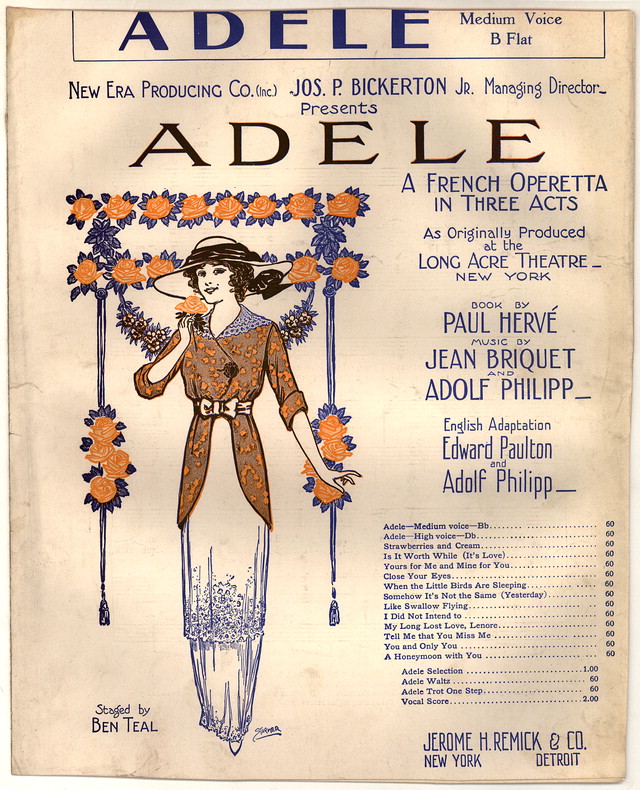
Sheet music cover for “Adele.”
At home, however, Philipp’s style of show, genuine small-theatre musical comedies in the German ‘Posse’ vein, without spectacle or (mostly) chorus girls, and the attention firmly fixed on the action, the comedy and the songs, had proven itself undeniably popular, and it was no coincidence that it was soon after followed by a local attempt in a similar vein (but with chorus girls) in a popular handful of shows at Broadway’s little Princess Theater.
Philipp subsequently joined Saul Rechmann in running the Yorkville Theater as a home for German-language plays and musicals (Wie einst im Mai, Die Schöne vom Strande etc) and, with the coming of the First World War, authored (under an umpteenth pseudonym, ‘F Schumacher’) and mounted a typically outspoken play called Zabern, which provoked the German ambassador in New York to demand its closure as being insulting to the Kaiser. He also authored, produced and starred in a patriotic American comedy-drama called Tell it to the Marines, whilst continuing with his run of allegedly adapted musicals. The Girl Who Smiles topped the 100-performance mark, but Two Is Company was a 29-performance failure. Mimi, yet another piece built on the lines of Alma, and produced at Washington with the equally fake-French Chapine (real name: Helen Benedeck) starred, failed to make it to town in its original production, but Philipp’s play was adapted and remusicked by another specialist of the book-based comedy musical, composer Ivan Caryll, and George Hobart, and the result was later produced in New York as Kissing Time (Lyric Theater, 11 October 1920).
Although he thereafter went quiet on the musical front, Philipp did not remain inactive.
The intriguingly titled play Tin Pajamas (w Paulton) closed on the road but, having insulted the Kaiser in the First World War, in 1933 this up-front Jewish author turned out as his last Broadway effort, a very early anti-Hitler play, Kultur. Then he finally went into retirement. He died in New York at the age of 72.

Sheet music cover for Adolf Philipp’s “Schützenmarsch” from the Volksstück “Klein Deutschland.” From: John Koegel: “Music in German Immigrant Theater; New York City 1840-1940.”
An accurate list of Philipp’s early German credits is hard to establish, as a second Adolf Philipp was, like him, operating out of Hamburg around the same time as the semi-American one was authoring his earliest Operetten. However, his claim of ‘hundreds of performances’ in Germany make it likely – even allowing for his penchant for fibbing about his identity and fictionalising his curriculum vitae – that he was the author of the musical shows listed below, in their various versions. As opposed to ‘Kleopatra by Adolf A Philipp’ et al.
1885 Die Brieftaube (Karl Stix) Klagenfurt 21 January
1888 Die Royalisten (Josef Manas) Braunschweig 19 July, Terrace-Garten, New York 8 June 1893
1889 Der Abenteuerer (Stix/w Emil Sondermann) Carl-Schultze Theater, Hamburg 14 September
1892 Der arme Edelmann (Aurel Donndorf/w Sondermann) Carl-Schultze Theater, Hamburg 29 November
1893 Der Corner Grocer von Avenue A (Karl von Wegern) Germania Theater 19 October
1893 About Town Chicago Opera House 25 December; Casino Theater 26 February 1894
1894Der Pawnbroker von der East Side (von Wegern) Germania Theater 1 March
1894 Doktor Darkhorst Germania Theater 30 April
1895? Mein New York Germania Theater
1895 Der New Yorker Brauer und seine Familie Germania Theater 15 September
1896 Der Butcher aus der erste Avenue Germania Theater 17 April
1896 New York bei Nacht Germania Theater
1897 Klein Deutschland Germania Theater 10 February
1897 The Gypsy Bride (von Wegern) Terrace Garten
1897 Dollars and Cents Germania Theater 29 September
1897 Die Reise nach Amerika
1898 A Day in Manila Germania Theater (von Wegern) 6 October
1900 Geheimnisse von New York Germania Theater 15 September
1900 Der Millionen-Schwab Germania Theater 25 December
1901 Der Kartoffelkönig (w Edward A Weber) Germania Theater 19 April
1901 Im Lande der Freiheit Germania Theater 21 September
1901 Der Teufel ist los (w Edward A Weber) Germania Theater 31 December
1902 New York in Wort und Bild (Mein New York) Germania Theater
1903 Uber’n grossen Teich (Der New York Brauer) Deutsch-Amerikanische Theater, Berlin 29 August
1904 New York Deutsch-Amerikanische Theater, Berlin 22 November
1905 Aber, Herr Herzog! Deutsch-Amerikanische Theater, Berlin 2 September
1906 Im wilden Westen Deutsch-Amerikanische Theater, Berlin 23 October
1906 Der Sorgenbrecher Deutsch-Amerikanische Theater, Berlin 22 December
1909 Alma, wo wohnst du? Wintergarten `zum schwarzen Adler’ 25 October
1910 Therese, sei nicht böse Wintergarten ‘zum schwarzen Adler’ 1 September
1911 Hetty macht alles Wintergarten ‘zum schwarzen Adler’ 14 January
1912 Auction Pinochle Adolf Philipp’s 57th Street Theater 12 November
1912 Das Mitternachtsmädel Adolf Philipp’s 57th Street Theater 1 September
1913 Adele (Edward Paulton/w Paulton) Longacre Theater 28 August
1913 Two Lots in the Bronx (Paulton/w Paulton) Adolf Philipp’s 57th Street Theater 27 November
1914 The Midnight Girl English version w Paulton 44th Street Theater 23 February
1915 The Girl Who Smiles (Paulton/w Paulton) Lyric Theatre 9 August
1915 Two is Company (Paulton/w Paulton) Lyric Theater 22 September
1917 The Landlady Yorkville Theater 12 September
1918 Oh Emilie! Yorkville Theater 9 March
1920 Mimi (w Frank E Tours/Paulton/w Paulton) Shubert Belasco Theater, Washington 13 March

Kevin, as always you’ve found grand illustrations!
I reviewed Mr Kogel’s book and gave it ten gold stars. I hope folk will buy it.
And now will American ‘historians’ stop landmarking ‘The Princess Theatre musicals’ as something important in New York musicals history?
Adolf Philipp is THE MAN! :-)
Apologies to Mr. Koegel but the bloody internet has a thing against umlauts ..
https://boydellandbrewer.com/music-in-german-immigrant-theater-hb.html
(And gimme back MY umlaut!)
wonderful, kurt – I did my phd about the perod just before this one. fascinating! thank you. g
This is really fascinating. Does anyone know of his song »CVathrina« from the Revue (or operetta?) »Hüben wir drüben« (probably from his 1903-1907 years in Germany?). I really would like to find out more about this.
Thomas, Hüben wir drüben is an alternative title for the musical comedy ABER, HERR HERZOG produced in Berlin in 1905.
I am the coordinator of the Ellis Island Discography Project at Ellis Island National Museum of Immigration. In the course of doing some research, I came upon the operetta Übern großen Teich by Adolph Philipp. This operetta, which was made for immigrants, appears to speak to the immigrant experience of the early 1900s, including having a portion of it taking place on Ellis Island. From my understanding, not only was it a success in America, it travelled to Europe and an English version was made for the American audience.
For the reasons mentioned above, we would be very interested in acquiring, if possible, a copy of the operetta text. I am not sure, but I think I saw somewhere, it may have been called New York Brewer at one point. If, by any chance, you happen to have sound recordings that were based upon the Übern großen Teich, we would also be interested in purchasing a mp3 of them.
In short, any help would be greatly appreciated. This operetta sounds amazing.
Given the pandemic, I am working from home.
Please take care out there,
Eric Byron